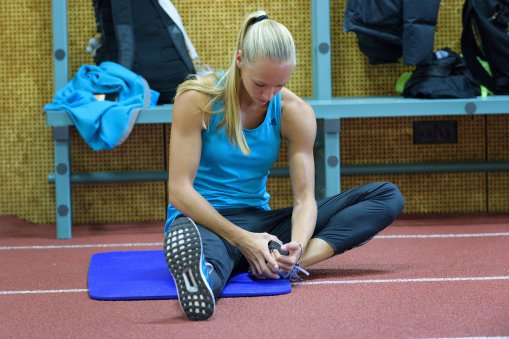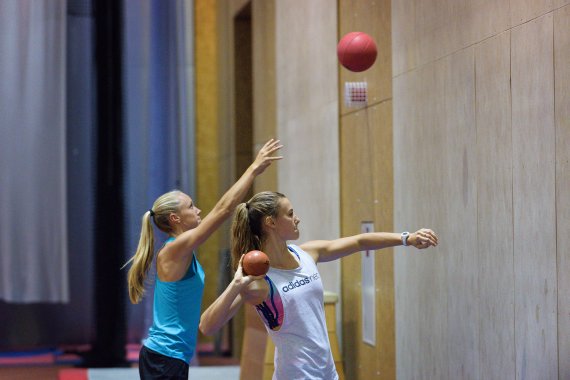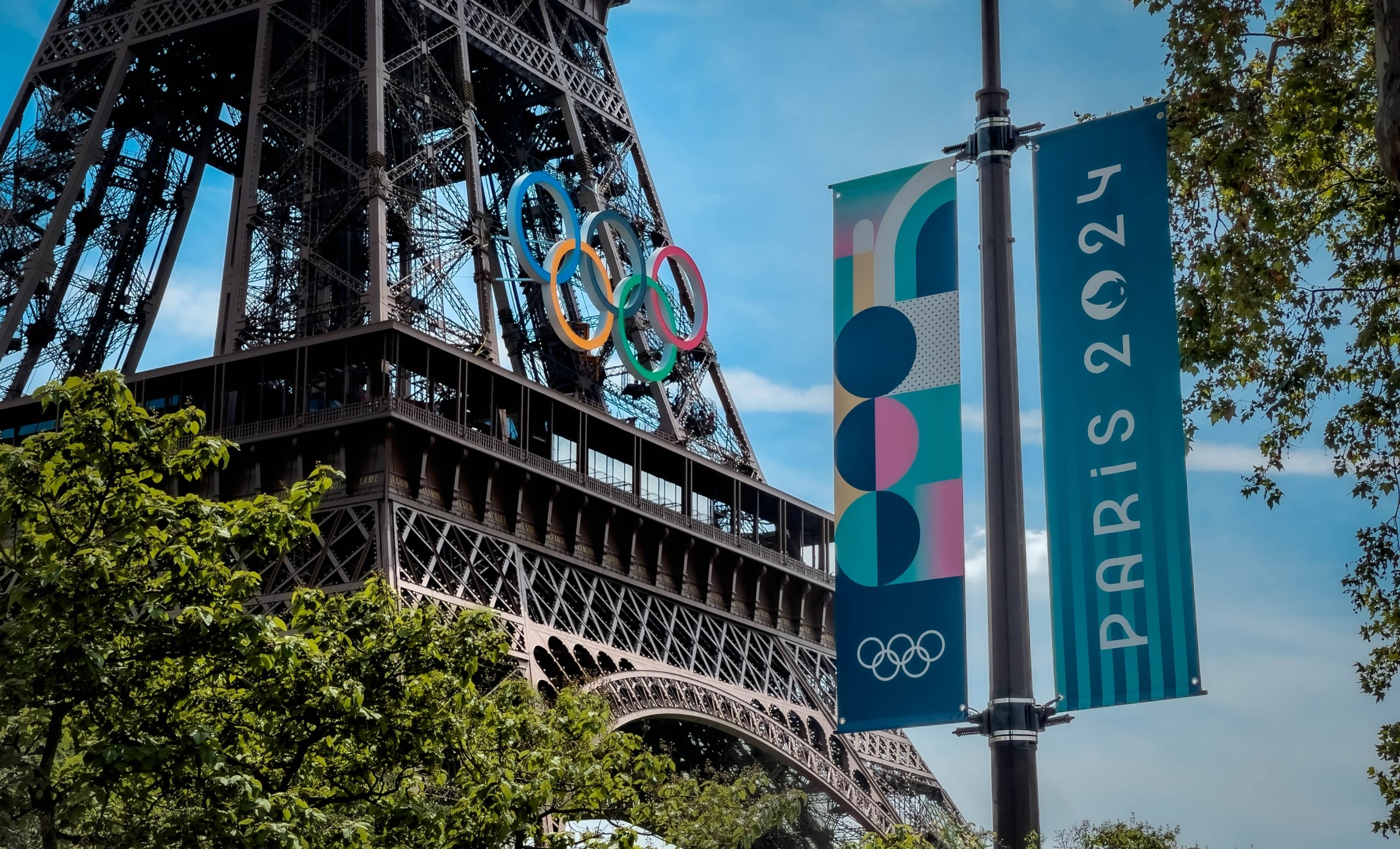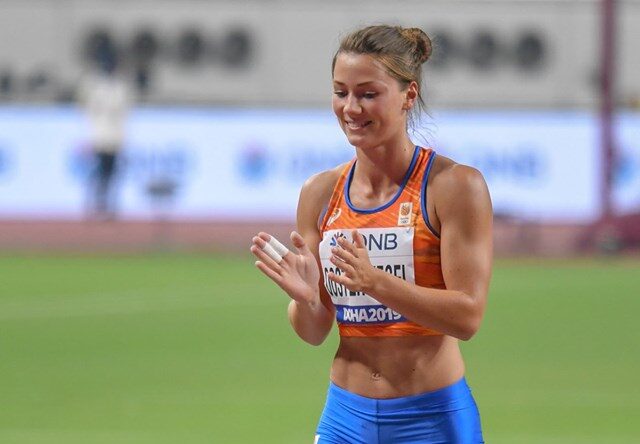Everything at Papendal sports centre in the woods near Arnhem smacks of the Olympic Games. A large signboard at the entrance displays a countdown to the opening ceremony on 5 August and at the entrance to the athletics hall there is a board showing all the top Dutch sportspeople who already have their tickets in the bag.
The sports complex is currently a second home for Wageningen students Nadine Visser and Eva Hovenkamp. They train here nearly every day to get into top form for the Olympic Games. All-rounder athlete Nadine Visser has already won a place on the Dutch team, while sprinter Eva Hovenkamp is still in suspense. If she and the relay team do well in the 4×400 metres in the European championships at the beginning of July in Amsterdam, a ticket to Rio comes in reach for her too.
Volatile
On rainy days like today the athletics team trains indoors. On the first floor of the Arnhem Hall is a 130 metre-long indoor track where the athletes can practise their starts, tempos and 100 metres. It is quiet here today. Normally it’s a full house, says Hovenkamp but today it’s just her, Visser and her training mate, world champion Dafne Schippers, as well as a few male athletes and a group of wheelchair athletes. All quietly training away. It is pleasantly cool in the hall but the cardigans and shirts are soon stripped off, revealing bodies on which not a gram of fat is to be seen.
Nadine Visser: ‘I love the feeling of taking a hurdle fast.’
Visser is going to run again today for the first time in a while. The 21-year-old all-rounder has been troubled by injuries recently. First she had the start of a stress fracture in her shin, now she has a strained hamstring. ‘One injury leads to another,’ she says as she takes off her tracksuit trousers. ‘It all heals fairly quickly but something else always starts up. I am very volatile and it seems there is always a lot of tension in my muscles. That is my strength, but also perhaps my weakness.’
Visser is not allowed to sprint and jump hard at the moment but she is still optimistic about her recovery. ‘I know that once I’m fit again, I can be on top form again in time.’
Warming up
Hovenkamp is taking it easy today too. She’s just taken part in the Dutch championships and has no training commitments. A bit of stretching, a bit of warming up, a stint on the hometrainer and a consultation with the physio, and that’s it for today. In the next few days she’s got to up her game: usually mainly a 100 and 200 metres runner, Hovenkamp is now training for the 400 metres. It would be quite a coup for the 19-year-old to succeed in going to Rio in the end, because last year she was still in the juniors. ‘I am now a first-year senior, so I was aiming for the European Championships under 23s for 2017. I thought it was too soon for me to make it to the European championships and the Olympic Games. If you had asked me four or five months ago whether I had a chance of going to Rio I would have said ‘certainly not’.

Both Visser and Hovenkamp are students of Health and Society in Wageningen, though they are not often to be found on campus these days. Hovenkamp, a first-year, attends a lecture and a seminar twice a week. Visser, in the third year, took a break from her studies in February. ‘I wanted to focus entirely on sport. I’ll start up again in September.’ Hovenkamp likes having something else in her life apart from sport. ‘If the running isn’t going so well for a while, I can focus on something else. Luckily Health and society is not a terribly taxing degree course; if I read the book and write a summary of my lecture notes I can pass the exam.’
Nice study advisor
Wageningen is a good university for top sporters, say the girls. ‘I don’t have to get a certain number of study points and I am allowed to take longer to get my degree,’ says Visser. ‘And I’ve got a very nice study advisor, with whom I make a plan every year as to which courses I will take.’ Hovenkamp too is using her plan now to combine her studies with her sport. ‘I have a lot of email contact with my teachers too,’ adds Hovenkamp. ‘Most of them are flexible. They don’t mind what you do as long as you hand things in on time.’

At a tournament you see absolutely all the athletes playing cards
Nadine Visser
The tight training schedule leaves the athletes little time for a social life. They don’t drink, they don’t see their coursemates outside lectures, and they skip the parties and activities. Most of their friends are here at Papendal. Nadine: ‘We have the same training schedule so we often eat together in the evening, go to the cinema or play games. I am a real games fanatic, which you get a lot of in athletics. All athletics like games. At tournaments you see absolutely everyone playing cards.’ Hovenkamp: ‘The other athletes have become a second family; you see each other more often than your own parents. You can’t keep anything a secret here, either. In no time everyone knew there was a nice boy living in my house.’
Because even though her parents live near Wageningen, Hovenkamp chose to move out. ‘I have a room in a student house in Renkum. So in the basement lives a boy who’s been my boyfriend for a few months now.’
Starting block
Nadine Visser is troubled by a strained hamstring.
Hovenkamp and Visser have both been athletes since childhood. It soon became clear they had talent and they took part in national and international youth competitions. Now Visser competes with the best athletes in the world. She likes hurdle races best. Even now she is injured she can fly over the hurdles effortlessly. ‘I just enjoy it the most and, sure, that’s probably mainly because I’m good at it. That often automatically makes something more enjoyable. I love feeling the way I get over a hurdle and pick up speed in a race.’ Yet she is not thinking of specializing at the moment. ‘I love the diversity of the pentathlon. And I can still improve so much on the throwing events and the high jump that it would be a pity to specialize. It’s nice to see the progress I make each year.’
The two athletes each have their own way of dealing with the stresses of competitions and major tournaments. ‘In the call room you have to wait for between 15 and 30 minutes until you can go to the starting blocks,’ explains Hovenkamp. ‘Then I go to the loo one more time, tie another double knot in my shoelaces and drink a bit more.’ Visser likes to do something nice in the call room. ‘Some people go into a world of their own, but I like to have people around me. Anything to avoid feeling that tension. I can get pretty nervous before an important competition and then I like to relax a bit beforehand. Only when I get out onto the track do I focus.’

Once I’m in the starting block I switch gears
Eva Hovenkamp
Hovenkamp is ‘pretty sociable’ too. ‘My trainer told me I could do with getting a bit more nervous before the start. I just stand there smiling and looking around me. Some athletes shut themselves off completely, but I don’t know whether that’s the approach for me. I quite like to have a chat as a way of relaxing. Only when I’m in the starting block do I switch gears. Then I try to get angry so that my first step after the starting shot will be a furious one. That brief, hard contact with the track gives you a lot of energy from the track. Usually you know straightaway whether you got off to a good start and you feel whether you are well-positioned in the race.’
Zero expectations
Hovenkamp tries not to think during the race. ‘You don’t have any time to think about your technique or the length of your stride. I find that difficult because during the training you learn so many things you want to apply in the race. But you just have to be first over the line, no matter how, because you’re not going to get a second chance.’
Visser: ‘In general athletes often say that in a race that doesn’t go so well all sorts of thoughts go through your mind and in a good race they don’t. When I have to go into the blocks I don’t think about anything except “react to the starting shot”. In a technical event that is less so. Especially in a throwing event, I can think of some aspect of technique I need to pay attention to just before throwing.’
Although it is difficult to go into a major tournament such as the Olympic Games without expectations, both athletes try to tone down their dreams. Hovenkamp: ‘If I get to go to the Olympics I won’t be there to shine like Dafne Schippers. I am simply not as fast as her. If you know you are the green one among all the stars, you are a lot more relaxed. Actually I should go there with zero expectations. If I put myself in the underdog position I can only do better than expected.’
Visser: ‘I don’t like saying I want to get into the top so many. They are exhausting days: you start early in the morning and go on until late in the evening. Just like most other athletes, I tend to set high standards for myself, but in the circus of the Olympics I don’t want to focus too much on my personal record. The pentathlon starts with the hurdle race and since that is my best event, that’s where I have to prove myself. So it would be great if I can do well in that. Then once the high jump – my toughest event in training – is over, I can relax and get on with the rest.’




